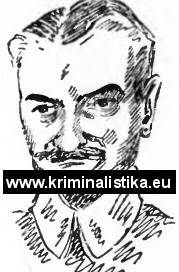Oldřich Filipín
A threefold murderer
Chateau in Náměšť nad Oslavou - 1927

The incitent happens in Náměšť nad Oslavou on February 3rd, 1927 and the journalists write about it for several months. It happpens in the chateau yard, in the Economic and Forest Office and that is what attracts the journalists attention most. Jindřich Haugwitz, the descendant of the significant nobleman Bedřich Vilém Haugwitz (1700 - 1765) who used to be the Chief Czech Chancellor, the State and Conference Secretary and the author of the Theresians reforms.
A chatelian night-watch notices the thirteen-room flat, situated on the first floor, is on fire. A sixty-eight-year old head forester Jindřich Till, his seriously ill wife Anna and their twenty-six-year old maid Marie Kořenovská live there. The night-watch wakes up two officers staying in the flats on the ground floor and calls in the chatelian fire brigade. Firemen find three massacred human bodies in the flat. There are five centres of fire found in the flat and thus it is obvious that the flat was set on fire wilfully. Both the local people and the chateau employees help to extinguish the fire. And so does the murderer. The murderer himself even assists in carrying the dead bodies from the first floor to an office on the ground floor...
Jindřich Haugwitz - the chateauowner

The burnt-out flat is searched the following day. Some strange fingerprints are found on the desk where the murdered Till used to keep letters and money. The same fingerprints are found on the force-opened drawer lying on the floor. As those fingerprints do not match the fingerprints of the murdered, it is obvious they must belong to the murderer. Despite the cold outside, the window of the maid's room is wide open. The lightning conductor is quite close to that window and the murderer used it to leave the flat and some footprints are found in snow there. The footprints are of the same kind and there is no doubt that the three people were murdered by one person.
The search proves the murderer stole 4 CZK from the drawer. Jindřich Till was known to be a penny pincher who calculated all the expences with an extraordinary accuracy. Besides the money, a used silver setting and an iron box with a completely new setting (a trousseau of the maid who was just about to get married) are stolen from the flat too. When thinking about all the stolen things the crime is sure not to be committed by an experienced criminal or someone on the lookout for "a grand haul".
Jindřich Till, the murdered head forester

The event after the arrival of the commission of inquiry spots both the police investigations and the destiny of an unimpeachable family in the end. A police dog, taken there from Brno, leaves the car immediately after opening the door to take an airing. While running about joyfully, the dog jumps on a nearby standing Gustav Vojtěch. He is not just a chatelian employee but the direct subordinate of the murdered head forester. He and the other rubber-necks are standing in front of the chateau expecting the policemen to ask them questions. Later on, some people say the event proved Vojtěch to be involved in that murderer despite the fact the police dog was not on the scent yet.
The requiem mass takes place in the local St. John the Baptist Church on February 12th, 1927. Tradition has it that Marie Kořenovská is followed by young women and men. The police investigations prove the murderer to be one of them. By the way, that is even proved by the photo taken after the burial. What is more, the lid of a sprinkle falls away during the burial and it rolls to one of the young men - the murderer himself. Many people take it as a sort of "Divine Providence" later on.
Those young people followed Marie Kořenovská
(the murderer is the fourth man from the left)

The very same day, I mean the day the burial takes place, Jan Eric Hanussen, a soothsayer, gets to Náměšť because the sensation-loving journalists wanted him to. He presents his public séance in Cejl vaudeville in Brno (later known as "Radost Cinema", nowadays used as a squash court) and the journalists forced him to brand a chatelian employee as the murderer. He is said to say that the murderer is "somewhere between heaven and earth". That rather brief and pointless statement of the well-known soothsayer becomes the object of journalists' guess-works and it also impeaches reliable police investigations based on well-proven and reputable methods.
According to the autopsy, there are seven stab wounds, caused by both sharp and blunt instrument, found on the Jindřich Till's body. The medical experts guess the stab wounds to be caused by an axe. The very first punch was vital. The head of Anna Tillová was hit with the same instrument four times. Five more punches of the same character are found on the head and body of Marie Kořenovská. A little dog is found dead in the burnt-out flat too. Its lungs indicate suffocation as the principal cause of death. Anna Tillová's lungs prove she was alive and breathing even a few minutes after having been attacked. She was not attacked as cruelly as her husband and their maid were. The autopsy proves they died immediately after the murderous attack.
Jan Eric Hanussen "at work"

The committee of inquiry and policemen set several versions of that incident including the possible murderer. They make a list of all the people who could get to chateau. The police investigations based on comparing the fingerprints of those people take more than two weeks but it seems to be worthless because they do not manage to screen all the people from the list. A twenty-three-year old Oldřich Filipín is among them. Although he was called on twice, he never comes. He even seems "to nip off". His mother told the police she has been missing him and thus a wide police search for him starts. Filipín is found in the ruins of the chatelian basement. He has jumped there, cutting himself, attempting to bring his life to an end.
He spends there two days, but he is still alive. He manages to get out of the basement and although being cut on his hands, legs and neck, he returns home. His mother and her neighbours take him to hospital. Doctor František Špirk, the attending physician, notifies his patient to the police and Mr. Bursák, D. C. L., the senior councillor, orders monitoring Filipín until he is ready to be questioned. When being taken to hospital, Filipín himself admits he wanted to commit a suicide. As he cannot explain the reason for his suicide, he is monitored by policemen. He has become one of the most suspected. Not to dusturb Filipín and the other patients, the policemen's shoes are wrapped in rags. The reason is simple, Filipín speaks while sleeping. All he says is taken to evidence. He pleads quilty in his "dreams". His fingerprints agrees with the fingerprints found at the scene of crime. The general public know him to be a tiny, timorous, tearful and dependant boy. On the other hand, he is said to be a responsible gardener. His father is a heavy drinker. His mother brings her children well. One of his brothers owns brickswork in Náměšť.
The way the murderer left the flat
(the lightning conductor near the murdered maid's window)

During the first questioning, Filipín claims he murdered those people just because Gustav Vojtěch made him to. Gustav Vojtěch was a secretary of Jindřich Till. Vojtěch is said to pay Filipín 28,000 CZK for that murder. Gustav Vojtěch is taken into custody after that. The committee of inquiry find several "detective novels" during the house search in Vojtěch's house. Although the books are concidered to be "a sort of garbage", Vojtěch is keen on reading and collecting such books. That is his only hobby. On the other hand, while being at work, Vojtěch is known to be rather strickt and uncompromising and that is why he was not very popular. There was a kind of friction between him and the murdered, too. Mr. Till was an aging man (68 years) and Gustav Vojtěch was said to be his incomer. Nevertheless, Mr. Till had never spoken about his retirement.
All those facts, including the incident with the police dog, make everybody sure Filipín was influenced by Vojtěch. And so are the journalist of the tabloids. But Jindřich Haugwitz himself, the chateauowner, speaks in support of Gustav Vojtěch in public. He considers him to be a very responsible and loyal employee who is impossible to be involved in such a terrible crime...
The second questioning is the turning point. Filipín retracts his first statement crying, he pleads guilty and describes precisely what happened that night at the head forester's flat. At about 06:30 p. m. he creeps to the flat and rings the bell hiding an axe under his coat. The maid answers the bell. He hits her with the axe and she falls dead on the floor. After that, he attacks Anna Tillová and Jindřich Till from behind. He seek through the flat including the drawers where all their money are supposed to be hiden, but he finds only 4 CZK there. Being disappointed by his valueless haul, he steals the used silver knives and forks and the maid's trousseau. He sets the flat on fire then. After leaving the flat, he hides the stolen things under the road bridge which is 200 metres far from the scene of crime and they are really found there during the police investigations. And the motive? Filipín needs a large sum of money to start his own firm... Despite the fact Filipín pleas guilty, Vojtěch is released from custody on April 9th, 1927. He leaves Náměšť and moves. Nobody knows where to...
The drawing of Gustav Vojtěch

Filipín is taken to prison in Znojmo. He tries to escape from that prison early in the morning on March 31st, 1927. He blocks the toilet with a piece of rag pretending the water is running out on the floor. When the warder, František Švéda, opens enters the cell to learn what is happening, Filipín attacks him attempting to get possession of his gun. Although being hurt, the warder manages to beat back the attack. Filipín is accused of an assault and battery.
The report of the medical experts writes "Filipín is mentally retarded but fully responsible for all he has ever done..."
The police investigations are finished at the end of September 1927. Mr. Lochman,a defender, receives the Filipín's criminal charge on October 4th, 1927. The criminal charge contains 33 pages. Filipín is accused of a threefold murder, slander and assault and battery. There are 30 witnesses ready to give their evidence. On February 23rd, 1929, Filipín is senteced to death. Oldřich Filipín appeals, but the death sentece is sustained on October 24th, 1929. The then President, T. G. Masaryk, changes the death sentece to life imprisonment. Oldřich Filipín dies of tuberculosis in Mírov prison a few years later.
Some people were and some people are still sure that mentally retarded Oldřich Filipín was forced to murder by Gustav Vojtěch because he would not have been able to plan and commit such a crime on his own.
© Miloslav Jedlička, D. C. L.